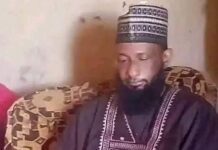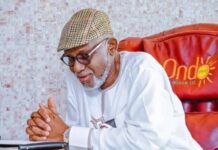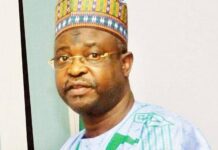By Ephraims Sheyin
News Agency of Nigeria (NAN)
When my phone rang at 10.47 p.m. on Monday, August 17, 2020 and Mr Dele Ojo, Acting Managing Director of the News Agency of Nigeria (NAN)’s name appeared as the caller, I was certain that trouble was already knocking. A news report must be “raising some dust’’ somewhere, I thought because it has been my lot to face such heat since I became NAN newsroom manager more than a year ago.
This time, however, it was something more serious. “Chairman is dead’’, Ojo said in his usually calm voice. “Alhaji..?’’ I asked. But there was no response. He had hung up.
Confused, I called Lawal Sale, Malam Wada Maida’s nephew downstairs. His line was busy. I called Yusuf Zango, former Editor-in-Chief (EIC) and Wada’s Executive Assistant when he was NAN Managing Director. His line was equally busy. The grim reality gripped me when I tried two others and met their lines all busy.
To say Wada’s demise was a personal loss to me is an understatement. He had been such a good leader, a mentor and a kind-hearted boss who not only recruited me into NAN, but nurtured me and maintained a deep interest in my professional growth.
I first met him when I appeared for the NAN job interview in Kaduna on Sept. 9, 1989. He was the EIC and clearly the youngest of the trio that formed the panel, others being Mr Fadare and Mr Okeke Ndukuba. He sat between the duo and I was sure he was the leader because he was just taking notes of my responses while others fired the questions.
I was first deployed to Wukari, in former Gongola State, before being moved to Kafanchan, Kaduna State in 1991, where I enjoyed myself filing lots of human interest stories. I did not know anyone was taking a special interest in my work in Kafanchan until the then Kaduna Zonal Manager, Alhaji Isa Husaini, sent a message summoning me to Kaduna one Sunday in December 1991. The EIC had come from Lagos and wanted to see me.
I was so scared. I searched my mind and checked all my reports but did not seem to get at what I might have done wrong for which I was being summoned.
When I met the EIC in his room at the NTI Guest Inn in Kaduna, it turned out that he was only impressed with my work, was proud of me and wanted to personally encourage me to keep up the good job. To my pleasant surprise, he mentioned some stories I had filed and suggested areas of possible follow-ups.
In May 1992, after the Zango-Kataf crisis, Wada again invited me to Kaduna and told me he was very impressed with my handling of the crisis and was particularly happy that I was fair to all sides. He said that it was good that my being from that area did not affect my news judgement. He was also happy that I was already writing features.
In 1993, late Shehu Abui, then DEIC, brought an application form for a journalism course at the International Institute of Journalism, Berlin, Germany. I was excited and started thanking him, but he said that I should “thank Wada’’.
“If I had a choice, I won’t nominate you for the course,’’ he told me flatly. He said he had earlier nominated Mr Danjuma Bittiong, then a principal correspondent, for training in India and would be accused of nepotism if he nominated another officer from southern Kaduna for another foreign course.
He added that he drew the EIC’s attention to that and was shouted down.
We attended the programme along with Emmanuel Ugoji and on our return in 1994, Wada was so impressed with my result that he showed it to several people.
In 1996, when I won a Reuters Fellowship to study in Stanford University, California, U.S., Wada was so happy. When I met him in Lagos where I had gone for my Visa interview, he told me that many senior colleagues had applied but did not win the fellowship, and advised me to take my studies seriously while in Stanford.
Laughingly, he told me that there were senior editors anxious to see the “village reporter’’ that won a fellowship they tried in vain to get.
On my return from Stanford late into 1997, he said “you are too much for Kafanchan now. You may have to choose between Lagos and Abuja.” I told him I would gladly serve wherever I was deployed to, and he said he would move me to Abuja.
While in Abuja, Abui, newly appointed EIC, told me, sometimes in 2001 or so, that the editorial management had submitted my name for foreign posting to the UN office in New York. From what I later gathered, Wada had insisted on a northern Christian and the editors felt I fitted the bill. But Shehu rejected their choice.
It was the first time he would deploy a reporter to a foreign office and he feared he would be accused of nepotism if he started with someone from his place, he explained to me. Though I felt bad, I did not argue with him. He later opted for Cosmas Elaigu, now late.
When NAN moved to its Permanent Headquarters and the former headquarters in Area 1, Garki, was converted to residences which were being shared, I contacted Shehu to request for one of the flats. He told me: ‘’Go and meet your father, Wada. He’ll give you.’’ I did and not only got a place, but was given the biggest available flat.
Long after Wada left NAN in 2003, I was appointed Zonal Manager and was in Jos for close to 10 years. By the time I returned to Abuja in 2019, he had been appointed the Chairman, NAN Board of Directors, and had proved a crucial stabilising factor to the Agency that was whacked by tonnes of petitions over promotions and protests by workers over various grouses with management.
Few weeks after I was appointed Head of Newsroom operations, the ministry of information requested for the services of one of our best editors. With about 25 editorial staff already seconded to various offices, the then EIC and acting MD was reluctant to release this egghead. When the pressure persisted, he went to Wada to seek his counsel.
Wada lectured him on the futility of his resistance and was even surprised at it.
“You can’t like NAN more than the minister who supervises you. He is your employer and has the last say. He could even ask you to leave NAN and work in his office. The other option is for you to leave your position so that someone ready to obey directives will replace you,’’ he said.
The Ag MD got the message.
As newsroom manager, Wada often called me to discuss some of our stories and was evidently impressed with what he said was the “improving quality of our news content.’’ On some occasions, he offered some story ideas and would ask me to encourage reporters to write features to bring enlightened opinion to bear on specific burning issues.
After my appointment as EIC, he told me to work extra hard so as to justify the confidence of the Board. He emphasised the need to be fair and firm. When the board reviewed the appointment, I visited him in his office and we discussed at length.
He told me everything that had transpired and counseled me on the need for patience, prayers and perseverance, while urging me to work even harder for NAN. He said I had nothing to worry about and should just remain focused. I left his office happy and satisfied that his confidence on me was intact.
Not long after that meeting, he called me over the stories we published on Ibrahim Magu, the former EFCC boss. He said the stories were good except that we mentioned names that should have been left out.
“When you get such super exclusives,’’ he lectured, “you must protect the source, the Agency (NAN), and the writer. We did not do that and shall certainly have to answer questions,’’ he said, and ended up with “we are NAN and cannot afford to be careless and reckless’’. It was the last time we spoke with him.
There is no doubt that Wada was a good man and cared for everyone around him. He insisted on calling his staff with their first names which only solidified that bond. There was something one could always take for granted – anytime you met him, you’ll always hear the truth because he said only what he meant and meant what he said.
As reporters under him, he took it upon himself to shield us from troubles arising from our stories, deploying his vast connections to maximum effect. Most times, he did that silently, but there were times he came into the editorial meetings smouldering and threatening to “sack’’ reporters before they sack him. The message was always very clear – be extra careful and professional at all times.
He had an obsession for merit and would always strive to reward it. Many of us found this very encouraging.
Former NAN MD, Ima Niboro, has suggested that the NAN edifice, which Wada built, be named after him. I support this fully. Wada was everything there was to be in NAN – reporter, editor, EIC, MD and Board Chairman. He lived for NAN and died serving the Agency which is why he is aptly called “Mr NAN’’.
At the burial of Shehu Abui on July 25, I picked a copy of the funeral programme to bring to Wada because it had pictures the two friends took as young men in jackets and jeans in London and South Africa. I had planned to take the booklet to his office and was imagining how he will laugh at those old pictures.
Alas, he did not wait to see the pictures. He opted to join his friend in the great beyond. The duo shared similar attributes – forbearance, humility, patience, kindness and generosity. May God reward them with Aljannah Firdaus.











